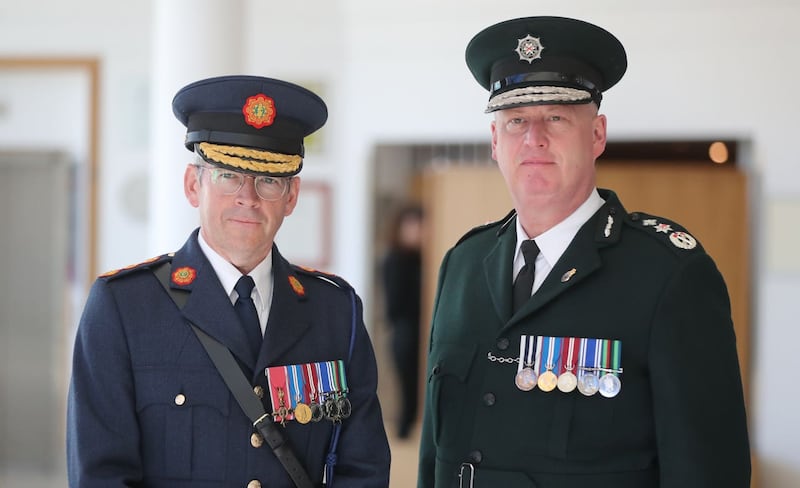A former Police Ombudsman has expressed “grave concern” at a chief constable approving an unlawful snooping operation targeting a Ombudsman member of staff and two journalists.
Details of the unlawful PSNI and Metropolitan Police actions were confirmed in a ruling issued by the Investigatory Powers Tribunal (IPT) on Tuesday.
The tribunal looks at complaints from people who believe they have been the victim of unlawful covert interference.
In its ruling the tribunal quashed a decision by George Hamilton to approve the Directed Surveillance Authorisation (DSA) as part of an investigation into a leaked document used in a documentary film about the Loughinisland massacre.
The IPT had been examining allegations that journalists Barry McCaffrey and Trevor Birney were subjected to unlawful surveillance by the PSNI over their 2017 film about the 1994 atrocity.
Six Catholic men were shot dead in the UVF attack, which was later found to involve collusion.
In 2018 both journalists were arrested as part of a probe, led by Durham Constabulary, into the leaked document.
When the men were released surveillance was placed on them and a Police Ombudsman official, now retired, suspected of providing the document after a DSA was approved.
A court later ruled that the warrants used by police to search the journalists’ homes and the film company were “inappropriate”.
The PSNI later apologised and agreed to pay £875,000 in damages to the journalists and the film company.

Former Police Ombudsman Baroness Nuala O’Loan, who is a member of the McCullough Review Group of Experts and Stakeholders said: “ These findings of unlawful activity by the police, and particularly by the then Chief Constable as reported in the IPT judgment are of great significance.
“The failure as late as 2018 to comply with the law in seeking to place two journalists and a member of staff of the Police Ombudsman under surveillance in an attempt to identify journalistic sources is a matter of grave concern.
“As a member of the Group of Experts and Stakeholders assisting the Reviewer Angus McCullough KC who is reviewing similar matters I will not comment further at this time.”
The IPT ruling said that the authorisation of the DSA was “unlawful in common law” and is “incompatible with the claimants” rights under Article 10 of the European Convention on Human Rights, which protects the right to express opinions freely without government interference.
Police have now been ordered to pay both journalists £4,000.
Mr Birney said the judgment “serves as a warning that unlawful state surveillance targeting the media cannot and should not be justified by broad and vague police claims”.
“The judgment raises serious concerns about police abuse of power and the law,” he said.
“Our case has exposed the lack of effective legal safeguards governing secret police operations.”
Mr McCaffrey, who was also the target of previous unlawful surveillance, said that despite police efforts they “were still unable to identify our sources for the film”.
“They wasted police time and resources going after us instead of the Loughinisland killers,” he said.
“The judgment, particularly its condemnation of Sir George Hamilton’s leadership, highlights the urgent need for reform.
“The police need to change, they should respect press freedom, they must abide by the rule of law and uphold the democratic principles of transparency and accountability.”
A former Police Ombudsman official, who has since left the watchdog, was also placed under surveillance as part of the investigation.
PSNI chief constable Jon Boutcher established the McCullough Review, headed by London based QC Angus McCullough, to examine the extent of police snooping earlier this year.
A spokesman for the Police Ombudsman said it is aware of the IPT judgment and “are currently considering the tribunal’s findings”.
Mr Boutcher said: “”I accept the Investigatory Powers Tribunal’s judgment that due consideration was not given to whether there was an overriding public interest in interfering with journalistic sources before authorising surveillance, which importantly, although it was not directed toward the journalists Mr McCaffrey and Mr Birney, it did impact them in 2018.”
“I am committed to ensuring that the Police Service of Northern Ireland use the powers available to us in a way that is lawful, proportionate and accountable.”
In June the PSNI admitted making 823 applications for communications data for journalists and lawyers over a 13-year period from 2011-2024.
Weeks later it emerged that more than 4,000 phone communications between 12 journalists were monitored by police over a three-month period.
Daniel Holder, director of the Committee on the Administration of Justice said the PSNI stepped outside the rule of law in subjecting journalists as well as Police Ombudsman staff to unlawful surveillance”.
“It is particularly concerning this appears to be grounded in desire to shield state agents who are suspects in legacy killings from accountability,” he said.
“Nobody is above the law and going after journalists who expose state involvement in some of the worst atrocities of the conflict its not what should be expected in a democratic society.”
SDLP leader and south Belfast MP Claire Hanna said the two journalists and their legal teams has “exposed a culture within the PSNI that demonstrated a lack of respect for the freedom and protection of journalism - a hallmark of any democracy”.
Sinn Féin South Down MP Chris Hazzard said: “It is not lost on the people of South Down that the time, effort and resources deployed by the British state to suppress journalists stands in stark contrast to the abysmal failure to investigate the murder of six men watching a football match in Loughinisland in 1994.
Policing board member Nuala McAllister said: “Today is truly a dark day for policing in Northern Ireland.
“This entire episode has been one of shame for the PSNI, from the act of surveillance themselves to the utterly vague police report into the matter.”
Conservative MP David Davis called for a public inquiry.
“This is the most dramatic and most far ranging decision I’ve ever heard from the Investigatory Powers Tribunal,” he said.







